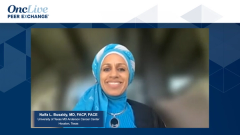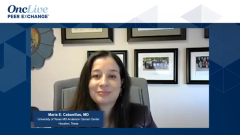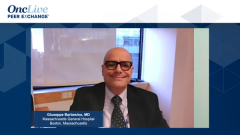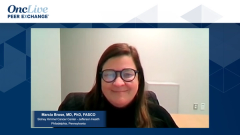
RAI-Refractory Differentiated Thyroid Cancer
The typical diagnostic work-up for patients with advanced differentiated thyroid cancer, the rationale for treating patients with radioactive iodine (RAI), and a definition of RAI-refractory disease.
Episodes in this series

Lori Wirth, MD: Can we talk a little about a typical diagnostic work-up and presentation of somebody with more advanced DTC [differentiated thyroid cancer]? Talk a little about iodine-refractory DTC. How do we think about what determines iodine-refractory DTC? Giuseppe, do you want to touch on that?
Giuseppe Barbesino, MD: Typically, we use the fine-needle aspiration biopsy for a diagnosis. At that point, if it’s a situation that’s simple, then surgery is recommended. That’s straightforward. As you mentioned, there are people who present with a situation that looks more advanced than the simple thyroid nodule. For those, sometimes imaging preoperatively is important; for example, cross-sectional neck imaging to understand the difficulty of a surgery. It’s important to explore the functionality of the vocal cords to make sure that there’s no problem that would modify the aggressiveness of surgery or the staging of surgery. All those things are important not in all patients but in patients in whom the presentation is concerning.
Once we’ve performed removal of the primary tumor if possible, and then removal of all the normal thyroid tissue, the issue is whether radioactive iodine treatment is to be given. That’s based on a risk assessment of the tumor based on the staging. It’s also somewhat based on the grade of the tumor, but that’s a little more up in the air in the sense that the grade is a bit of a continuum. The stage is pretty straightforward. So, we do issue recommendations on radioactive iodine based on the risk categories, most often as suggested by the American Thyroid Association. We do that in an adjuvant way without knowing whether we’re treating something that’s there, just assuming that it might be a residual tumor most of the time. That’s also based on the hope that radioactive iodine will destroy that potential residual tumor, which unfortunately isn’t a promise.
One major obstacle to these studies, potentially, is an incredibly effective and personalized targeted therapy as radioactive iodine. The only target is the follicular thyroid cancer cell, which has incredible limitations, partly because—given how early this was established—we don’t have good prospective studies to tell us for sure who will benefit and who will not in terms of staging from the radioactive iodine. Over the years, we’ve realized that radioactive iodine comes with a small price in terms of risks of other malignancy and other complications, so we’ve tailored a little better the indications to radioactive iodine, and we still treat a lot of patients who a) may not benefit, and b) may also not respond to radioactive iodine. We realize that only as a post hoc, meaning once the patient has been treated has a relapse of the thyroid cancer or when his thyroid cancer doesn’t respond.
The definition of what is radioactive iodine, a refractory tumor, is a moving target. There are several ways to look at it. The most obvious is that if you have a thyroid cancer that’s measurable in size and degree of advancement in a treatment with a therapeutic dose of radioactive iodine, in the range of 70 to 150 millicuries or even more, that doesn’t measurably respond to radioactive iodine. That’s certainly a thyroid cancer that’s radioactive-iodine-insensitive. We also use thyroglobulin sometimes. For example, in people with diffuse lung metastases that are difficult to measure radiologically, the only parameter we have is thyroglobulin. In thyroid cancer, the thyroglobulin doesn’t drop after radioactive iodine is clearly not responsive.
Obviously, there are cancers in which we don’t see iodine make it into the cancer. In post-treatment whole-body scan, we don’t see uptake. That’s also a radioactive-iodine-refractory cancer. I’d also argue that the cancer that relapses immediately after radioactive iodine is also refractory thyroid cancer. That’s an argument that can be had. But if I see a patient who, after a full treatment of 100 millicuries, 6 months later presents with nodal metastasis, the older approach was to give some more radioactive iodine.
I’d argue that it’s a good example of a refractory cancer in which more radioactive iodine would not be indicated. Although nowadays, as we’ll hear, there are ways to try to circumvent the problem of the refractoriness. On my mind, that’s the major problem: as an endocrinologist mostly managing patients with intermediate risk and who are a candidate for radioactive iodine, my main problem is finding out a priori which cancer will respond to radioactive iodine and which cancer will not respond.
Lori Wirth, MD: I’m glad that you gave a discussion on the definition of radioactive iodine, because we medical oncologists don’t think about things in such nuanced ways and don’t quite understand what radioactive-iodine refractory DTC is. The definition can be somewhat subtle. Having a conversation with the endocrinologist who knows and loves the patient can sometimes be very helpful.
Transcript edited for clarity.





































